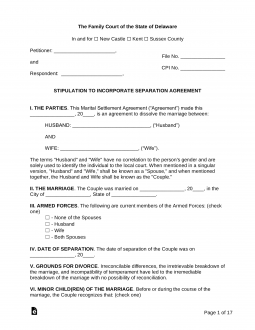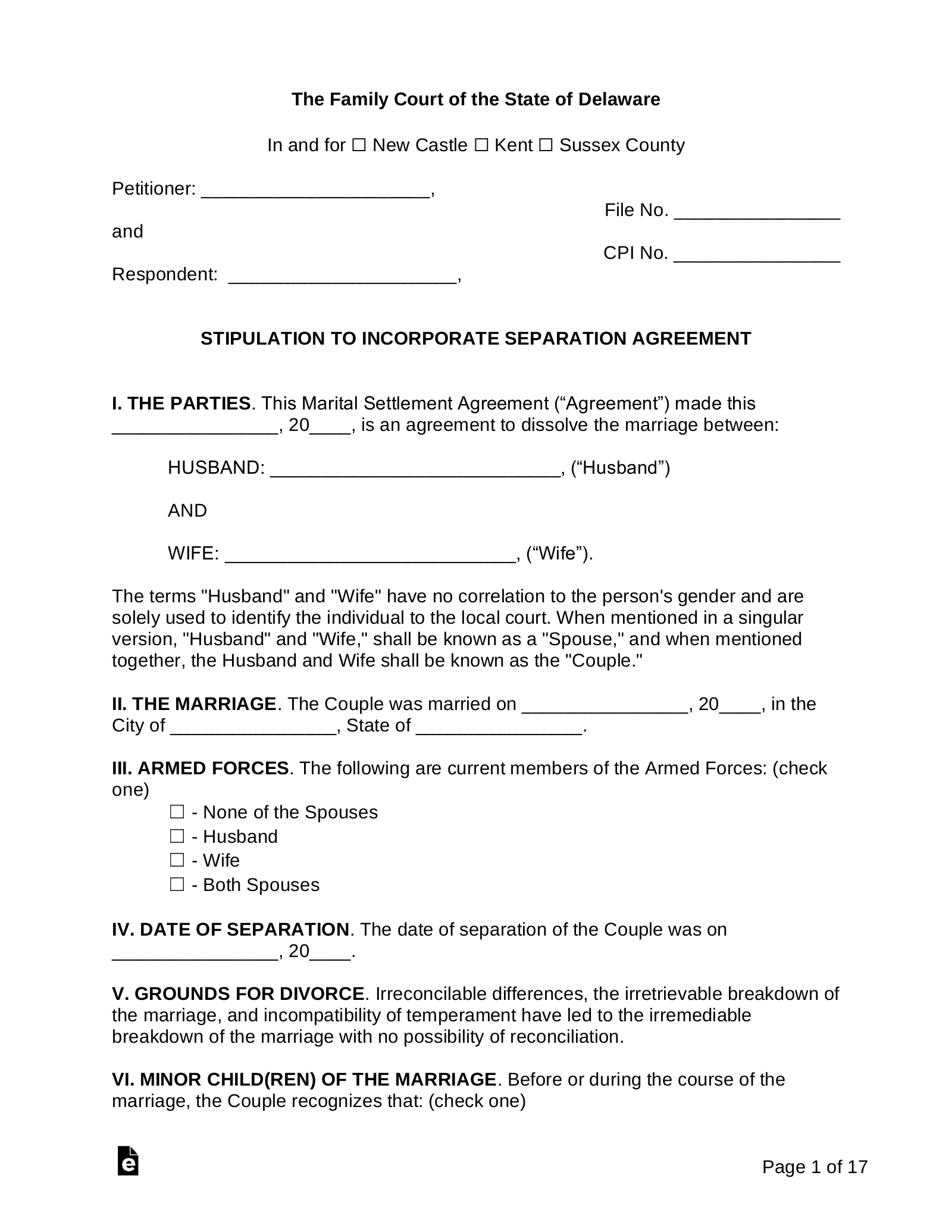Updated August 31, 2023
A Delaware marital settlement agreement is a contract between spouses that spells out their rights and obligations in the event of a divorce. Couples will typically negotiate the terms of separation following a complete disclosure of their finances.
After revealing their individual earnings, assets, and liabilities, the parties can establish financial stipulations (alimony and child support) fairly and within the limitations of their available income. A settlement agreement should also describe how the couple intends to divide marital property and debts.
While the agreement needn’t be filed with the court for it to be effective, it may be incorporated into the divorce case to create a contract that is enforceable by court order.
Table of Contents |
Divorce Laws
Statutes – Title 13, Chapter 15 (Divorce and Annulment)
Alimony (§ 1512)
Before alimony may be awarded, the court must determine that the receiving party:
- Relies on the other spouse for support and the other spouse is not contractually or otherwise required to offer support after divorce;
- Is without sufficient property to reasonably support their needs;
- Cannot support him or herself through employment or is the parent or guardian of a child whose condition permits them to forgo employment;
The amount of alimony a spouse receives will be calculated by the court after considering all relevant factors, which may include the following:
- The ability of the spouse seeking alimony to reasonably support their needs independently and the financial resources to which they have access;
- The expense and time needed to obtain sufficient training or education to allow the spouse seeking alimony to procure an appropriate position of employment;
- The living standard established by the couple while married;
- The length of the marriage;
- The age of each spouse and their physical and emotional condition;
- The contributions each spouse made to the other as it relates to their vocational skills, education, training, earning capacity, and career;
- If the spouse providing support can sustain their needs while paying alimony;
- The tax consequences of each spouse; and
- If either spouse has stopped or postponed employment, economic, or educational opportunities while married.
Alimony Calculator – calculators.law
Child Support (§ 508)
These guidelines regulate how the court establishes and modifies the child support obligations of a spouse.
Child Support Calculator – courts.delaware.gov
Division of Property (§ 1513)
Delaware courts use equitable distribution law and, therefore, will divide marital assets and liabilities as they deem fair and just.
Grounds for Divorce (§ 1505)
A divorce may only be awarded if the court concludes that the marriage has irretrievably broken down and that reconciliation between the spouses is unlikely. The marriage is irretrievably broken if:
- The spouses voluntarily separate; or
- The spouses separate due to the misconduct of the respondent; or
- The spouses separate due to the mental illness of the respondent; or
- The spouses separate due to incompatibility.
Interim Support (§ 1512(a))
A party who is dependent on their spouse for financial support may receive interim alimony during the pendency of the divorce case.
Residency (§ 1504)
The petitioner or respondent must continuously reside in Delaware for six (6) months before filing for divorce.
Separation (§ 1503(7) & § 1505)
Spouses must separate for six (6) months unless the divorce is requested due to misconduct. The parties may reside in the same dwelling, although they must maintain separate bedrooms and not have sexual relations with one another.
Divorce Forms
All divorce documents must be downloaded and subsequently prepared using an application that supports the Microsoft Word format.
- Where to File – Family Court
- Filing Fee – $165 or more depending on the case (see fee schedule)
- How Long Does it Take? Thirty (30) to ninety (90) days (source: 3stepdivorce.com)
Uncontested Divorce with No Children:
- Petition for Divorce/Annulment (Form 422)
- Information Sheet (Form 240)
- Vital Statistics Sheet (Form 441) or Vital Statistics Same Sex Marriage (Form 441SS)
- Request for Notice (Form 400)
- Stipulation to Incorporate Separation Agreement (Form 443)
- Affidavit of Unknown Address (Form 241)
- Affidavit of Non-Military Service (Form 405)
- Affidavit That a Party’s SSN is Unknown (Form 421)
- Request to Proceed Without a Hearing (Form 446)
- Affidavit in Support of Request to Proceed Without Hearing (Form 447)
- Ancillary Financial Disclosure Report (Form 465)
- Affidavit of Mailing (Form 850)
- Form of Order – Ancillary Financial Disclosure Report (Form 449)
- Ancillary Pretrial Stipulation (Form 466)
- Affidavit of Appearance in Divorce Action/Notice of Injunction (Form 406)
- Waiver of Rights under the Servicemembers’ Civil Relief Act (Form 420)
- Answer to Petition for Divorce/Annulment (Form 448)
- Affidavit in Support of Application to Proceed in Forma Pauperis (Form 257P) (PDF)
- Notice of Trial-Readiness (not available online)
- Notice of Hearing (not available online)
Uncontested Divorce With Children:
- Petition for Divorce/Annulment (Form 422)
- Information Sheet (Form 240)
- Vital Statistics Sheet (Form 441) or Vital Statistics Same Sex Marriage (Form 441SS)
- Request for Notice (Form 400)
- Stipulation to Incorporate Separation Agreement (Form 443)
- Affidavit of Unknown Address (Form 241)
- Affidavit of Non-Military Service (Form 405)
- Affidavit That a Party’s SSN is Unknown (Form 421)
- Request to Proceed Without a Hearing (Form 446)
- Affidavit in Support of Request to Proceed Without Hearing (Form 447)
- Ancillary Financial Disclosure Report (Form 465)
- Affidavit of Mailing (Form 850)
- Form of Order – Ancillary Financial Disclosure Report (Form 449)
- Ancillary Pretrial Stipulation (Form 466)
- Affidavit of Children’s Rights (Form 279)
- Affidavit of Appearance in Divorce Action/Notice of Injunction (Form 406)
- Waiver of Rights under the Servicemembers’ Civil Relief Act (Form 420)
- Answer to Petition for Divorce/Annulment (Form 448)
- Affidavit in Support of Application to Proceed in Forma Pauperis (Form 257P) (PDF)
- Certificate of Completion of Parent Education Class (not available online)
- Notice of Trial-Readiness (not available online)
- Notice of Hearing (not available online)
How to File for Divorce in Delaware (12 steps)
- Fill out the Petition for Divorce
- Other Required Forms
- Situational Forms
- Marital Settlement Agreement
- File Divorce Documents
- Serve Divorce Notice on Other Spouse
- Answer Divorce Petition
- Parent Education Class
- Notice of Trial-Readiness or Notice of Hearing
- Divorce Judgment
- Ancillary Financial Disclosure Report
- Name Change
1. Fill out the Petition for Divorce

The filing party (the “petitioner”) must start by completing the Petition for Divorce/Annulment. Among other things, the petition must state whether the spouse desires a hearing for their case and whether they want the court to decide alimony and the division of marital property. Once the petition is complete, it must be signed by the petitioner in the presence of a notary public or an authorized member of the court.
2. Other Required Forms
Other documents need to be completed and filed with the Petition for Divorce/Annulment. The required forms are as follows:
- Information Sheet
- Provides the court with the personal and contact information of each spouse to ensure that official notices are delivered correctly.
- Vital Statistics Sheet or Vital Statistics Same Sex Marriage
- States similar information to that mentioned in the Information Sheet, but must instead be filed with the Division of Public Health and Vital Statistics.
- Request for Notice
- With this form, the petitioner tells the court how they intend to serve the other spouse (the “respondent”) with notice of the divorce case.
- Marriage Certificate/Certificate of Civil Union
- The petitioner must obtain the original Marriage Certificate/Certificate of Civil Union OR a certified copy from the Division of Public Health and Vital Statistics in the jurisdiction where the marriage/civil union took place.
3. Situational Forms

Additional documents may be required to elaborate on the Petition for Divorce/Annulment. The petitioner should review each form below and fill out those that apply to their case. Once complete, the documents must be signed by the appropriate party in the presence of a notary public or clerk of the court.
- Affidavit of Children’s Rights
- This form is required if the spouses have common children below the age of eighteen (18).
- Affidavit of Unknown Address
- This affidavit must be completed if the respondent’s whereabouts are unknown and actual efforts to locate them have been made.
- Affidavit That a Party’s SSN is Unknown
- If the petitioner does not know the respondent’s whereabouts and social security number, this affidavit must be completed.
- Waiver of Rights under the Servicemembers’ Civil Relief Act
- If the respondent is currently serving in the military, they will need to sign this waiver OR both an Affidavit of Appearance in Divorce Action/Notice of Injunction and an Answer to Petition for Divorce/Annulment. If the respondent chooses not to sign any of these forms, the petitioner must file a Motion to Appoint an Attorney (see Motion Instruction Packet).
4. Marital Settlement Agreement
Couples are encouraged to negotiate the terms of their separation as it relates to alimony, child support, parental responsibilities, and the division of marital property. To ensure the fairness of the settlement terms, each party should provide the other with a disclosure of their income, assets, expenses, and debts. The terms and conditions the parties agree to should be recorded in a Marital Settlement Agreement.
- The settlement agreement may be incorporated into the divorce decree and, thus, made enforceable by court order. To accomplish this, the parties must sign the agreement in the presence of a notary public, execute a Stipulation to Incorporate Separation Agreement, and file both documents with the court.
5. File Divorce Documents
The petitioner must make at least one (1) copy of each divorce document and file their paperwork with the family court (the forms can be filed in person, by mail, or by e-mail). A $165 filing fee will be charged to the petitioner, although additional charges may apply in certain filing situations. Filers who cannot afford the fee can request an exemption by providing the court with a notarized Affidavit in Support of Application to Proceed in Forma Pauperis.
6. Serve Divorce Notice on Other Spouse

If the respondent lives in Delaware, the court will arrange to personally serve the respondent with notice of the divorce case. If the respondent’s address is unknown, the court will serve the notice by publishing an article in a local newspaper. If the respondent doesn’t live in Delaware but their address is known, the court will serve the notice by certified mail AND publish an article in a newspaper. All fees associated with service are at the petitioner’s expense.
7. Answer Divorce Petition
The respondent must reply to the divorce petition within twenty (20) days of the service date. If the respondent wishes to deny any claims made in the petition and/or request a court hearing for their case, they can file an Answer to Petition for Divorce/Annulment. If the respondent has no response to the petition, they may instead file an Affidavit of Appearance in Divorce Action/Notice of Injunction. Both documents must be signed in the presence of a notary public or court clerk.
8. Parent Education Class

Spouses who have children below the age of eighteen (18) are responsible for scheduling their appearances at a Parent Education Class (see list of court-approved parenting programs). After completing the class, a Certificate of Completion of Parent Education Class will be issued to each spouse. The original certificate and one (1) copy must be filed with the court.
9. Notice of Trial-Readiness or Notice of Hearing
The court will mail each party a notice containing additional filing instructions. The type of notice and instructions provided will vary depending on whether a court hearing was requested.
- If neither spouse requested a court hearing, they will each receive a Notice of Trial-Readiness. The parties will have twenty (20) days from the issuance of the notice to file a Request to Proceed Without a Hearing and an Affidavit in Support of Request to Proceed Without Hearing (both documents must be notarized). A copy of the Request to Proceed Without a Hearing must be mailed to the other spouse.
- If a court hearing was requested, the parties will receive a Notice of Hearing indicating the date and time when they must appear in court. If the respondent is not in the military, the petitioner must fill out an Affidavit of Non-Military Service, sign it in the presence of a notary public or court clerk, and bring it with them to the hearing.
10. Divorce Judgement
A court commissioner will review the case and decide whether to approve or deny the Petition for Divorce/Annulment. If either party requested a court hearing, they must attend the hearing and present their cases before the commissioner. Otherwise, the verdict will be delivered to the couple by mail. If the petition for divorce is approved, each party will receive a Decree of Divorce/Annulment and a Commissioner’s Order.
11. Ancillary Financial Disclosure Report
The following instructions should only be completed if one (1) or both parties asked the court to handle the administration of alimony and marital assets/debts:
- Instructions for Petitioner
- The petitioner must fill out their portion of the Ancillary Financial Disclosure Report within thirty (30) days of receiving the divorce decree. They must sign the disclosure in the presence of a notary public, make one (1) copy, and mail the original document to the respondent. The petitioner must then complete an Affidavit of Mailing, notarize their signature, and file it with the court.
- Instructions for Respondent
- After receiving the Ancillary Financial Disclosure Report, the respondent will have thirty (30) days to complete their portion of the disclosure. Once complete, they must sign it in the presence of a notary public, make one (1) copy, file the original with the court, and mail the copy to the petitioner. Finally, the petitioner must file a notarized Affidavit of Mailing.
Once the above steps have been completed, the court will inform the spouses that they must file a Form of Order – Ancillary Financial Disclosure Report. A final hearing will then be scheduled upon which the parties must appear in court to settle matters involving alimony and the division of marital property.
12. Name Change
If a spouse asked the court to restore their former or maiden name as a condition of divorce, the new name will be indicated in the divorce decree. The decree can be used as legal proof of the change when updating their identification cards and personal accounts.


